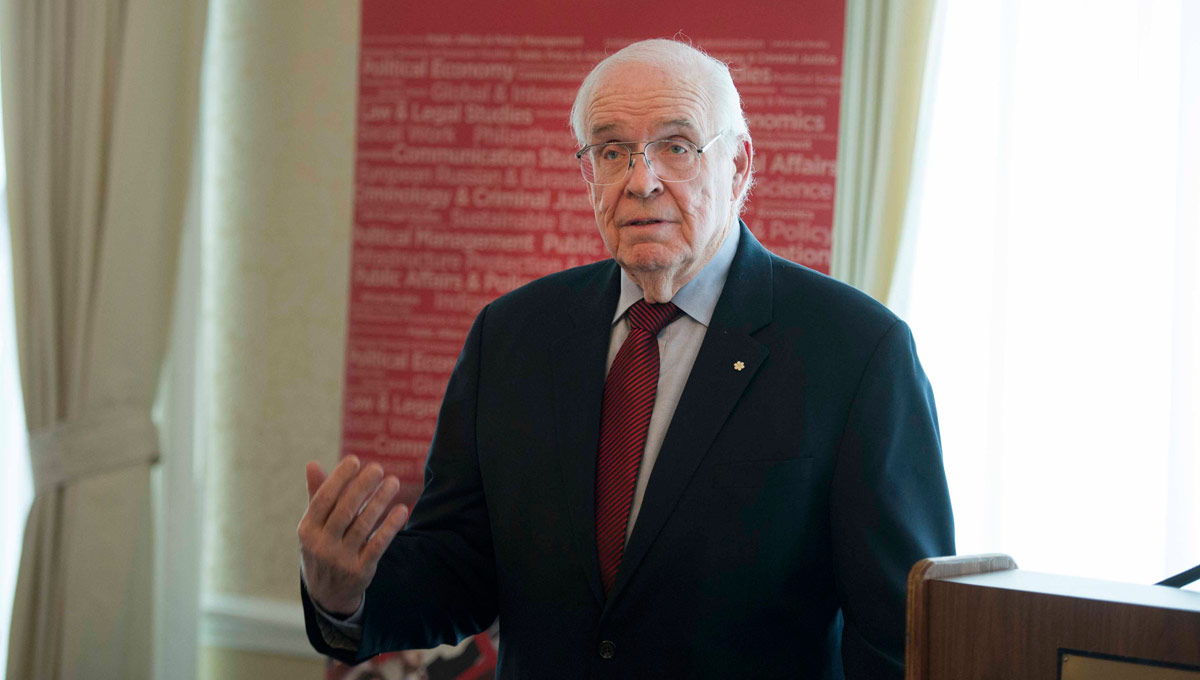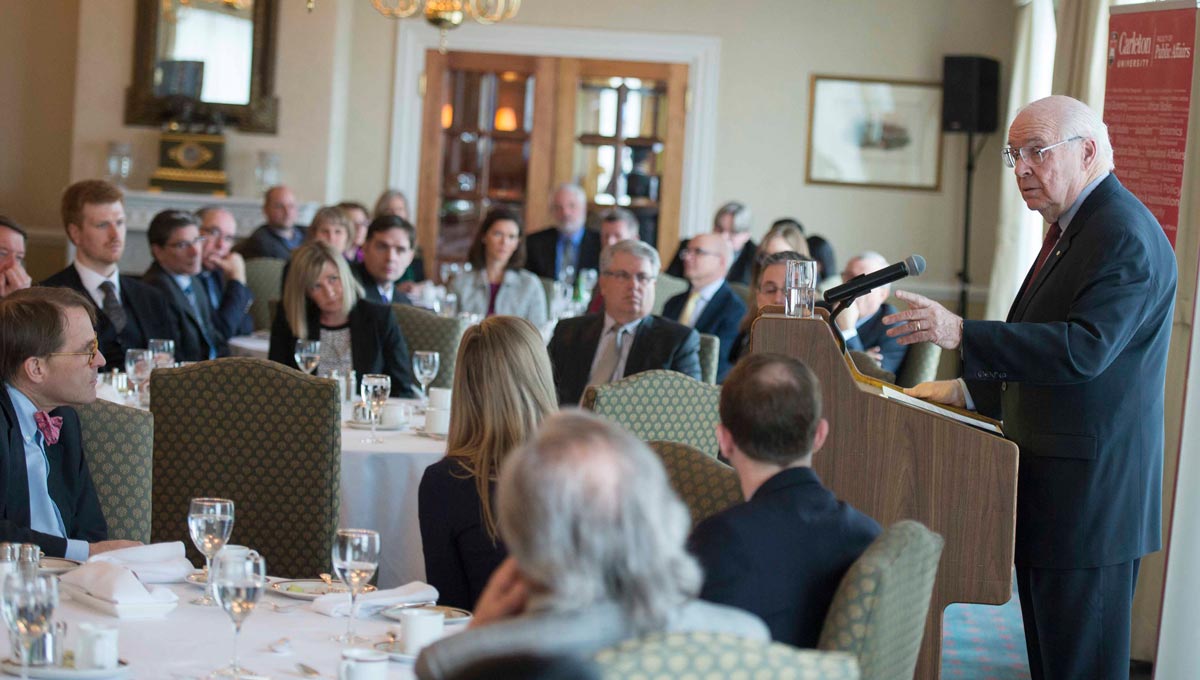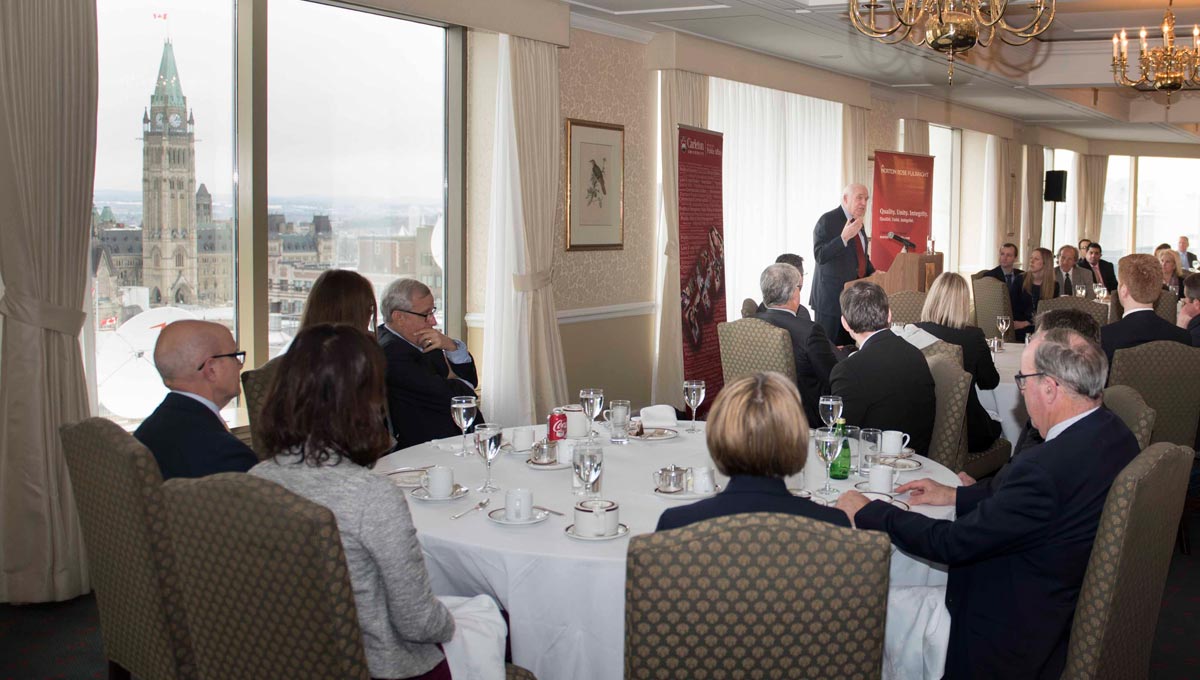By Elizabeth Howell
Photos by Justin Tang
Canada has an advantage over Mexico when negotiating with the United States and we shouldn’t be afraid to highlight that, former ambassador Derek Burney told a Carleton University event March 6.
Burney was Canada’s ambassador to the United States from 1989 and 1993 after serving a critical role in negotiating the Canada-U.S. Free Trade Agreement as Brian Mulroney’s chief of staff. Today, he is a senior strategic adviser at law firm Norton Rose Fulbright and an unofficial adviser, like Mulroney, to Prime Minister Justin Trudeau.

Derek Burney, former Canadian ambassador to Washington who helped negotiate the NAFTA.
Burney joked that he was happy to be a “Rip Van Winkle” at the Rideau Club event co-hosted by Carleton’s Centre for Trade Policy and Law. He summarized the environment around the free trade negotiations to provide context for today’s discussions, 30 years later.
The trade deal received top political priority in Canada to better secure access to our largest market, Burney recalled, while mostly mid-level officials in the United States worked on it. Canada was determined to make a deal that suited its interests, and even walked away from negotiations at one point.
The deal was reached in late 1987 and implemented in January 1988 before being superceded in the 1990s by the North American Free Trade Agreement (NAFTA). Trade between the two nations tripled in the first decade, standing now at $2 billion daily.

Trump’s Trade Policy:
Tweaks to NAFTA Needed
Trump has said he wants changes to NAFTA. Burney characterized them as “tweaks” and said some changes would be welcome.
As for fears that NAFTA could cease, no formal termination has been proposed in Congress, which has authority over trade deals in the United States, said Burney, and Canada should stand up for itself in the face of any radical changes.
“For any negotiation to be successful, it has to be mutual agreement by parties on the objective,” Burney said.
He added that unlike Mexico, Canada has no border problem or trade deficit. Also unlike Mexico, Canada has security arrangements with the United States and fights alongside Americans in wars.
“Canada is not a problem for the United States. We’re better placed than any to be part of the solution of United States initiatives,” Burney added, citing examples such as energy, infrastructure, continental security and the opioid epidemic.
As much as Canada benefits from the United States, Burney warned that we should be developing trade with other nations – particularly the rapidly growing economies of Japan, China, Korea and India. Canada needs to follow the lead of Australia, he said. As an isolated nation in the south Pacific, it has spent years forging relationships with other nations out of necessity. Canada, while “cocooned” near the United States, needs to do better, he urged.

Canada’s Entrepreneurial Spirit
“The entrepreneurial spirit in Canada is a bit like the tulips. They’re underground for most of the year and above ground for only one month,” he said. But he doesn’t see Canada moving soon.
“Banks are fat and happy and big business is fat and happy.”
Burney also levelled criticism at the U.S. for its economic and political actions. Deficit spending has never been a formula for economic growth, he said, which is best exemplified by Japan, in the red for 30 years and still with flat growth.
He also took aim at the president’s habit of tweeting quick opinions about the news of the day at all hours. His tweets – including recent ones about immigration policies – attract worldwide attention.
“You can’t run a government by tweet. It may be just my age, but it just won’t work,” said Burney.
No matter what turn Trump’s trade policy takes, Burney said Canada will be fine if it keeps calm, remains disciplined and prepares for all contingencies. He urged Canadian policy-makers, however, to be mindful of non-trade differences and assert themselves tactfully instead of insisting the Canadian view is always right.
Tuesday, March 7, 2017 in Economics, Faculty of Public and Global Affairs, International
Share: Twitter, Facebook



